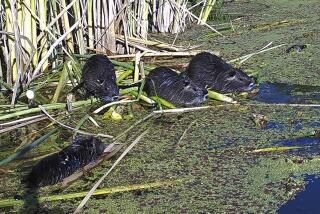Thai Farmers Turning to Nutria Breeding
- Share via
BANGKOK, Thailand — Thai peasants struggling with hard economic times are turning to a huge South American rodent to save the family farm.
But authorities fear the get-rich-quick craze to breed the water-loving animals--variously known as nutria, coypu or beaver rat--will end in environmental disaster and financial fraud.
The animals, as large as a medium-size dog, look like giant rats with webbed feet and strong front teeth. They are at home in marshes and swamps and feed on all kinds of vegetation.
Over the decades, promoters touting the ability of nutria to breed rapidly have periodically sought to introduce them in various areas around the world.
The problem is that not much of a market has ever been developed for nutria meat or fur. And when breeders can’t sell nutria, they turn them loose--usually into swampy areas where they wreak havoc on vegetation.
In Thailand, the world’s leading rice exporter, millions of acres of paddies could be at risk, experts warn.
Nutria are already getting loose. At least one found its way in January to a Bangkok karaoke bar, where its appearance panicked a hostess who mistook it for a giant rat.
The Agriculture Ministry released a statement Jan. 9 warning farmers to stay out of the nutria-breeding business despite tempting advertising campaigns promising riches.
“The nutria is not an agricultural animal,” the ministry said. “You will be deceived and will not have long-term profits. If the nutria is released into nature, it cannot be eliminated.”
*
Lousiana is cited as an example. Nutria were imported to that U.S. state in the 1930s by farmers who hoped the brown-and-gray fur would catch on with the public. It didn’t.
Now, nutria have overrun Louisiana and become a pest. Their voracious hunger has denuded marshes, and officials say their burrows weaken levees and bridge supports.
Thailand and many of its Southeast Asian neighbors are reeling from an economic collapse and, like the Louisiana farmers of the Great Depression, people are desperate to find ways to earn extra cash.
Enter promoters extolling the nutria’s money-making ability. First introduced in Thailand just three years ago by a Taiwanese businessman, the original 4,000 nutria have multiplied to more than 1 million.
“I first saw my neighbor breed them and earn so much money in a short period of time that he could build his new house,” said one breeder, Narong Viboolchart. “I then decided to follow.”
Thai promoters also play on an angle that always seems to sell in Asia--claiming that eating nutria can improve your sex life.
“Its feet, tail and bones are treasures for us,” said Suvit Vivitkunaporn, an importer. “They are the key ingredients for the sexual medicine.”
But authorities see a more sinister angle at work. They say the nutria business is really a pyramid scheme that will collapse and leave the farmers broke.
The standard contract has a farmer rent a breeding pair by paying a deposit of 30,000 baht ($600). The money is returned after the animals have been breeding for five years.
The importers pledge to buy offspring from the first litter at $100 each, then $60 apiece for later litters.
Each litter can number from four to 12 animals, and a mother can become pregnant three times a year. After buying the offspring back, the importers rent them out as breeders to other farmers.
Everyone makes money as long as new farmers can be found to rent breeding pairs. But Thai authorities note that eventually no new farmers will sign on, which will leave the last breeders in without their deposits and with no market for their animals.
*
Thais have discriminating palates and there is no demand for nutria meat. Fur coats are unknown in the tropical climate. And even in colder countries, the fur of big rats is not much sought after.
“We think this business is sort of deceitful,” said Somchai Sunthornwat, deputy minister of agriculture. The ministry plans to ban nutria imports, he said.
But in rural Kanchanaburi province in western Thailand, advertising and radio campaigns are still inviting people to join the nutria business and go into breeding.
“It is the best-ever economic animal,” said Suvit, the importer. “Pigs, chickens, even cows can never yield this good of a result to raisers.”
Suvit dismisses the environmental worries raised by agriculture officials.
“The nutria is not a crocodile,” he said. “If it gets loose, it won’t eat people. Why worry?”
More to Read
Sign up for Essential California
The most important California stories and recommendations in your inbox every morning.
You may occasionally receive promotional content from the Los Angeles Times.













